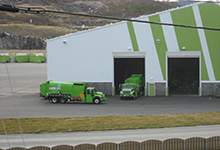Finding Markets for Recycling Material

On January 1, 2018, China stopped accepting most recycling material from other parts of the world including Canada. As China has long been the dominant market for many recycling products, the impact of this decision has global implications. But what is the effect locally?
You may be surprised to know that this decision has no effect on the recycling program here in St. John’s or the greater Avalon area, largely due to how our recycling program was designed and the low contamination rates in the recycling products we receive.
Contamination is unwanted material mixed in with the good material. For example, let’s say you own a business making kitty litter from newspaper. You order a load of recycled newspaper with expectations that it will be pure. However, when you start processing it, it turns out that there are shards of glass and plastic shopping bags mixed in with the paper. The unwanted material slows down your process and may even cause some equipment damage. Would you buy that same material from the same recycling facility? Probably not.
Before setting up the recycling program, our research determined that Canadian end markets would be the preferred choice for our recycling material, but in order to access that market, we would need to provide a product that was clean with very little contamination.
To ensure that the markets would always purchase our material, here’s what we did:
- We designed our recycling facility so that containers are kept separate from paper and cardboard;
- We required residents to sort their material using blue bags, placing containers in one bag and paper fibres in another; and
- We did not include glass and plastic shopping bags as these products increase contamination levels.
Many municipalities allow residents to put all of the recycling together in one bag or cart and the actual sorting of the materials takes place at the recycling facility. Unfortunately, the sorting process can become compromised, which generally leads to more contaminates being mixed in the final product. Historically, China has been the primary market for these types of materials.
Today, many of these ‘one cart’ systems are stockpiling their recycled products and are reprocessing that material in order to reduce the level of contamination, all the while hoping that China will reverse their decision. This has increased operational expenses and severely reduced revenues until new markets are found.
Here in St. John’s the blue bag system allows collectors to see what products are placed in the bags and unacceptable items are often left behind with a note to educate the resident on proper sorting. The end result is a cleaner product coming into our recycling facility that is easier to sort and process. This creates a higher level of confidence in the quality of the material that is being shipped to our markets on a daily basis.
The St. John’s recycling program was designed to result in a reliable, clean product that would be in demand by end users, and we have done just that! An exceptionally great job has been done by our residents, our collectors, our contractor, their sorters and other staff to keep our recyclables contaminant free!
Lowest contamination rate in Canada
In St. John’s our contamination rate has remained at 3 per cent. This is the lowest contamination rate in Canada, where the average is closer to 10 per cent, thanks to all residents of St. John’s and surrounding municipalities that take the time to properly sort and prepare their recycling.
The contractor operating the Material Recovery Facility has secured as many Canadian markets as possible for our recycled items and they have been buying from our contractor ever since. They like our material, a lot.
The only material that was previously shipped to China is our blue bags and the contractor has already secured a new market for this product. The recycling market changes occurring in China have not impacted our recycling sales from the Robin Hood Bay Materials Recovery Facility, and we don’t anticipate they will negatively affect it in the future.
